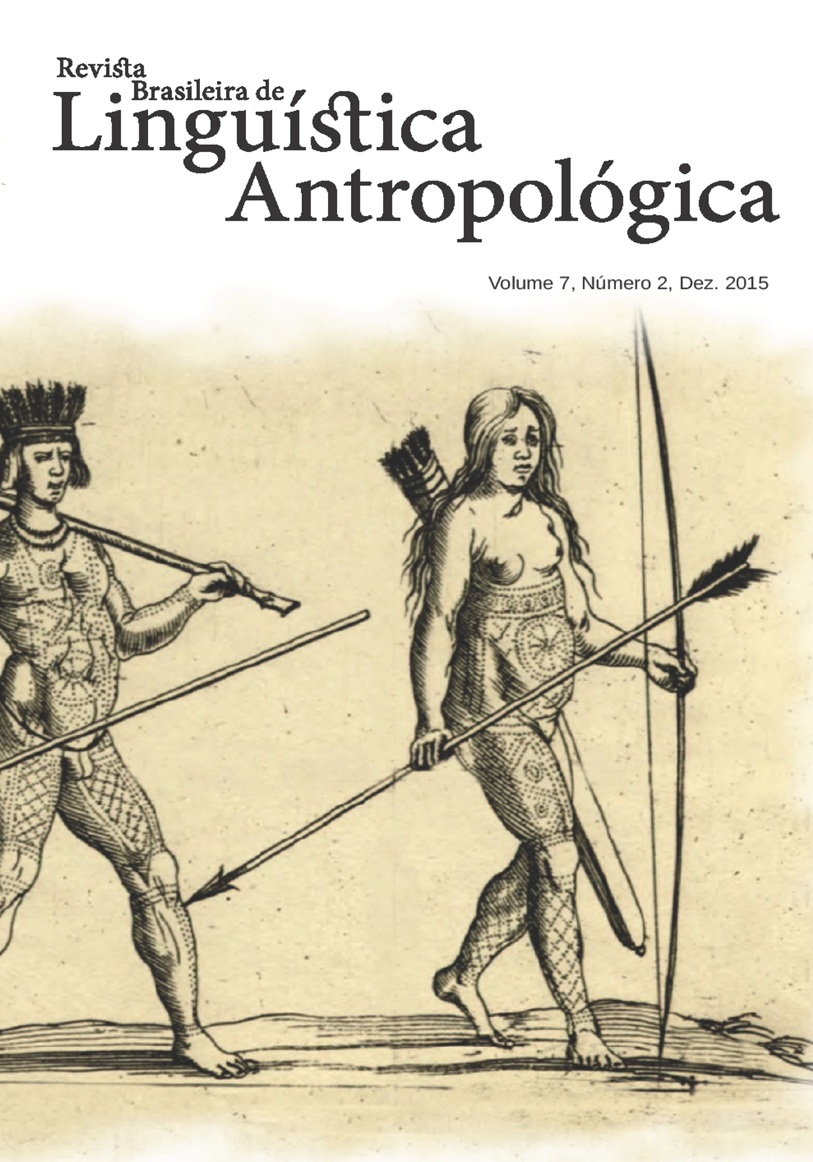Bases culturais para atribuição de gênero em Manxineru
DOI:
https://doi.org/10.26512/rbla.v7i2.20604Keywords:
Gender. Agreement. Cultural basis. Metaphoric processes. Aruák familly.Abstract
This paper is about the semantic motivations for the masculine/feminine gender distinction in Manxineru (Yine), Aruák family. We argue that gender is a distinctive feature of the referents of nouns, semantically transparent, marked by means of suffixes in nouns referring either to stages of human beings or kin relations, although it appears crystallized in the phonological forms of other nouns. We show that the gender of a referent triggers obligatory agreement by means of personal affixes in nouns in possessive relations, and in nucleus of verbal and adjectival intransitive predicates, according to the gender of the subject, and in the case of transitive verbs, according to the gender of the object. We conclude that gender attribution in that language is modeled by the culture, and that in various cases it is of purely metaphoric nature.
Downloads
References
Aikhenvald, Alexandra Y. 2000. Classifiers: A typology of noun categorization devices. Oxford: Oxford University Press.
Borges, M. V. 1997. As falas feminina e masculina no Karajá. Goiânia: Universidade Federal de Goiás, Dissertação de Mestrado.
Campbell, Lyle. 2012. Typological characteristics of South American indigenous languages. The Indigenous Languages of South America: A Comprehensive Guide, ed. by Lyle Campbell and Verónica Grondona, 259-330. Berlin: Mouton de Gruyter.
Campbell, Lyle. 2012. Language contact and linguistic change in the Chaco. RBLA 5(2):255-287.
Dixon, R. M. W. 1982. Where Have All the Adjectives Gone? Berlin: Walter de Gruyter.
Dixon e Akhenvald. 1999. The Amazonian Languages. Cambridge: Cambridge University Press.
Drude, S. 2002. Fala masculina e feminina em Awetí. In A. D. Rodrigues, & A. S. A. C. Cabral (Eds.), Línguas indígenas Brasileiras: Fonologia, gramática e história. (Atas do I Encontro Internacional do Grupo de Trabalho sobre Línguas Indígenas da ANPOLL). vol. 1 (pp. 177-190). Belém: EDUFPA.
Facundes, Sidney da S. 2000. The Language of the Apurinã People of Brazil. Tese de Ph.D., SUNY-Búfalo: Búfalo.
Lakoff, G. 1987. Women, Fire, and Dangerous Things. University of Chicago Press.
Monserrat, Ruth M. F. 2000a. Características lexicais e morfológicas da fala masculina e feminina na língua Aweti. (MS)
Monserrat, Ruth M. F. 2000b. Prefixos pessoais em Awetý, Série Linguística III, Museu Nacional.
Ramirez, Henri. 2001. Uma gramática do Baníwa do Içana. (MS).
Ribeiro, E. R. 2012. A grammar of Karajá. Ph.D dissertation, University of Chicago.
Rodrigues, A. D. 2004. Sobre a possível origem da diferença fonética entre a fala masculina e a feminina em Karajá. Liames 4:115-121. Campinas, SP, UNICAMP.
Tovar, Antonio. 1961. Catálogo de las lenguas de América del Sur. Buenos Aires: Editorial Sudamericana
Downloads
Published
How to Cite
Issue
Section
License
Copyright (c) 2016 Revista Brasileira de Linguística Antropológica

This work is licensed under a Creative Commons Attribution 4.0 International License.
Authors who publish in RBLA agree to the following terms:
a) Authors maintain the copyright and grant the journal the right of first publication, and the work is simultaneously licensed under the Creative Commons Attribution License, which allows the sharing of the work with recognition of the authorship of the work and initial publication in this journal.
b) Authors are authorized to assume additional contracts separately, for non-exclusive distribution of the version of the work published in this journal (eg, publish in an institutional repository or as a book chapter), with recognition of authorship and initial publication in this journal.
c) Authors are allowed and encouraged to publish their work online (eg, in institutional repositories or on their personal page) at any point before or during the editorial process, as this can generate productive changes, as well as increase impact and citation of the published work.







